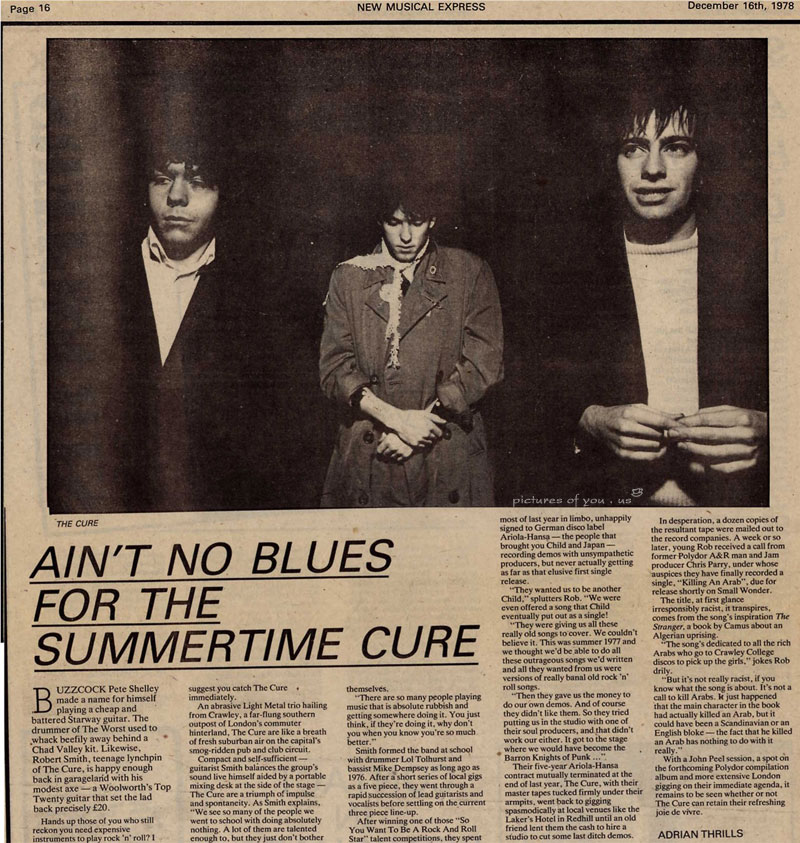Ain't No Blues for the Summertime Cure
Interview / By: Adrian Thrills

12/16/1978
- NME (UK)
Ain't No Blues for the Summertime Cure
Interview / By: Adrian Thrills

12/16/1978 New Musical Express
Ain't No Blues
For The Summertime Cure
Buzzcock
Pete Shelley made a name for himself playing a cheap and battered
Starway
guitar. The drummer of The Worst used to whack
beefily
away behind a Chad Valley kit. Likewise, Robert Smith, teenage lynchpin of The
Cure, is happy enough back in
garageland with his modest axe –
a Woolworth’s Top Twenty guitar that set the lad back precisely £20.
Hands up those of you who still reckon you need expensive instruments to play
rock ‘n’ roll? I suggest you catch The Cure immediately.
An abrasive Light Metal trio haling from Crawley, a far-flung southern outpost
of London’s commuter hinterland, The Cure are like a breath of fresh suburban
air on the capital’s smog-ridden pub and club circuit.
Compact and self-sufficient, guitarist Smith balances the group’s sound live
himself aided by a portable mixing desk at the side of the stage, The Cure are a
triumph of impulse and spontaneity. As Smith explains, “We see so many of the
people we went to school with doing absolutely nothing. A lot of them are
talented enough to, but they just don’t bother themselves.”
“There are so many people playing music that is absolute rubbish and getting
somewhere doing it. You just think, if they’re doing it, why don’t you when you
know you’re so much better.”
Smith formed the band at school with drummer Lol Tolhurst and bassist Mike
Dempsey as long ago as 1976. After a short series of local gigs as a five piece,
they went through a rapid succession of lead guitarists and vocalists before
settling on the current three piece line-up.
After winning one of those “So You Want To Be A Rock And Roll Star” talent
competitions, they spent most of last year in limbo, unhappily signed to German
disco label Ariola-Hansa, the people that brought you Child and Japan, recording
demos with unsympathetic producers, but never actually getting as far as that
elusive first single release.
“They wanted us to be another Child, “ splutters Rob. “We were even offered a
song that Child eventually put out as a single!”
“They were giving us all these really old songs to cover. We couldn’t believe
it. This was summer 1977 and we thought we’d be able to do all these outrageous
songs we’d written and all they wanted from us were versions of really banal old
rock ‘n’ roll songs.”
“Then they gave us the money to do our own demos. And of course they didn’t like
them. So they tried putting us into the studio with one of their soul producers,
and that didn’t work out either. It got to the stage where we would have become
the Barron Knights of Punk…”
Their five-year Ariola-Hansa contract mutually terminated at the end of last
year. The Cure, with their master tapes tucked firmly under their armpits, went
back to gigging spasmodically at local venues like the
Laker’s
Hotel in Redhill
until an old friend lent them the cash to hire a studio to cut some last ditch
demos.
In desperation, a dozen copies of the resultant tape were mailed out to the
record companies. A week or so later, young Rob received a call from former
Polydor A&R man and Jam producer Chris Parry, under whose auspices they have
finally recorded a single, “Killing An Arab”, due for release shortly on Small
Wonder.
The title, at first glance irresponsibly racist, it transpires, comes from the
song’s inspiration The
Stranger, a book by Camus
about an Algerian uprising.
“The song’s dedicated to all the rich Arabs who go to Crawley College discos to
pick up the girls.” jokes Rob
drily.
“But it’s not really racist, if you know what the song is about. It’s not a call
to kill Arabs. It just happened that the main character in the book had actually
killed an Arab, but it could have been a
Scandanavian
or an English bloke, the fact that he killed an Arab has nothing to do with it
really.”
With a John Peel session, a spot on the forthcoming Polydor compilation album
and more extensive London gigging on their immediate agenda, it remains to be
seen whether or not The Cure can retain their refreshing joie de vivre.
- Adrian Thrills